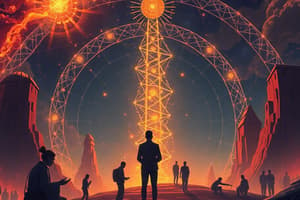Podcast
Questions and Answers
What is sociology?
What is sociology?
The study of how societies are organized and how the organization of a society influences the behavior of people living in it.
What does sociological imagination refer to?
What does sociological imagination refer to?
The ability to see the relationship between individual experiences and larger social influences.
Define the Industrial Revolution.
Define the Industrial Revolution.
The rapid development in the late 1700s and throughout the 1800s of manufacturing and industry, enabled by technological changes.
What is division of labor?
What is division of labor?
What does the term social conflict mean?
What does the term social conflict mean?
What is meant by economic class?
What is meant by economic class?
What is alienation?
What is alienation?
Define mechanical solidarity.
Define mechanical solidarity.
What is organic solidarity?
What is organic solidarity?
What does the term anomie refer to?
What does the term anomie refer to?
What is the main perspective of methodological individualism?
What is the main perspective of methodological individualism?
Who founded Hull House?
Who founded Hull House?
What is socially-engaged scholarship?
What is socially-engaged scholarship?
What are Veblen goods?
What are Veblen goods?
Flashcards are hidden until you start studying
Study Notes
Introduction to Sociology
- Sociology studies how societies are organized, and how that organization affects people's behaviors.
- Sociological imagination examines the effects of social structures and history on individuals.
- The Industrial Revolution led to the development of factories and mass production during the late 1700s and throughout the 1800s.
- The division of labor enabled specialized roles and tasks within the workforce, contributing to increased interconnectedness, but also potential economic disparities.
- Social conflict arises from differing needs and interests between social groups.
- Economic relationships influence the ownership and distribution of goods and resources.
- A class is a group with similar economic positions, needs, and interests.
- Labor is the ability to work, and wages are compensation for that labor.
- Marx saw economic relationships as a key factor impacting how society functions.
- Marx believed that social conflict, particularly between capitalists and workers, was central to society.
- Capitalists sought to minimize wages for maximum profit, while workers aimed for higher wages.
- Alienation is a feeling of disconnection from others, work, and one's humanity.
- Social structure encompasses the forces that influence individual behavior and are shaped by those actions.
- Societal solidarity refers to the patterns of connections between individuals.
- Mechanical solidarity exists in simple societies with strong cohesion and shared values.
- Organic solidarity characterizes complex societies with diverse roles, leading to interdependence despite individual differences.
- Integration refers to the degree to which individuals connect with their communities.
- Regulation involves a society's use of rules and norms to monitor behavior.
- Norms are societal expectations for behavior, shaping individual actions.
- Anomie describes a lack of clear moral guidance or expectations, potentially leading to social instability.
- Methodological individualism prioritizes individuals as the focus of societal studies.
- Social action refers to behaviors that contribute to the formation of social structures.
- Interpretive understanding focuses on the meanings people ascribe to their own actions.
- Culture, according to Weber, comprises the values that guide individuals' behaviors.
- The Chicago School, a group of sociologists at the University of Chicago, conducted influential research on urban life and its social patterns.
- Socially engaged scholarship involves communities in research processes, empowering them as researchers and data gatherers.
- Status is a social ranking relative to others.
- Conspicuous consumption is a way to demonstrate wealth through lavish spending on goods and services.
- The leisure class enjoys financial privilege, allowing them to avoid work for money.
- Pecuniary emulation is a competitive drive to accumulate wealth and show off one's status.
- Veblen goods are luxury items whose demand increases as their price goes up.
- Status symbols are visible cues that denote a person's social standing.
Studying That Suits You
Use AI to generate personalized quizzes and flashcards to suit your learning preferences.




